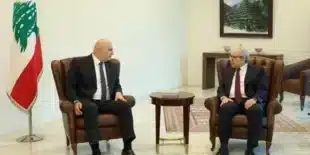Israeli Prime Minister Benjamin Netanyahu told U.S. mediator Amos Hochstein on Monday that a “fundamental change” is necessary after nearly a year of cross-border clashes with Hezbollah in Lebanon. Netanyahu stated that displaced residents from northern Israel cannot return home until the security situation significantly improves, and emphasized that Israel “will do what is necessary” to safeguard its security.
Defense Minister Yoav Gallant shared similar concerns with Hochstein, expressing that hopes for ending the conflict with Hezbollah are fading. Gallant underscored that Hezbollah, backed by Iran, has tied itself to Hamas and refuses to end its involvement, thus making military action the only viable option to secure the northern region.
Gallant also conveyed this message in a phone call with U.S. Defense Secretary Lloyd Austin, warning that time is running out for a diplomatic solution. Hochstein, however, cautioned Israeli leaders that a broader conflict with Lebanon would not necessarily return displaced residents to their homes and risks escalating into a prolonged regional war. The U.S. remains committed to seeking a diplomatic resolution in both the northern sector and Gaza.
Despite efforts by the U.S., Qatar, and Egypt to mediate a ceasefire in Gaza, there has been little progress in halting the fighting between Hezbollah and Israel. Hezbollah officials have indicated they would stand down if a Gaza ceasefire is reached, but Israel remains adamant that it cannot allow militants to operate near its northern border. The ongoing violence has killed hundreds, mostly fighters in Lebanon, along with civilians and soldiers on both sides, displacing tens of thousands.
Hezbollah’s deputy leader, Sheikh Naim Qassem, stated over the weekend that the group does not seek war, but warned that if Israel initiates one, there will be “large losses on both sides.” Israel and Hezbollah last fought a month-long war in 2006, which killed over 1,200 people in Lebanon and 160 Israelis.
Meanwhile, Israeli media reported possible tensions within the Israeli government, as Netanyahu is said to be considering firing Gallant, though Netanyahu’s office has denied these claims. Gallant, a former general, has disagreed with Netanyahu over the post-war governance of Gaza, favoring a plan where Palestinian entities, supported by international actors, would control the territory, rejecting any long-term Israeli occupation.
Netanyahu has also stated that the situation on the northern border is unsustainable, calling for a shift in the balance of power, though he did not specify how this would be achieved.


